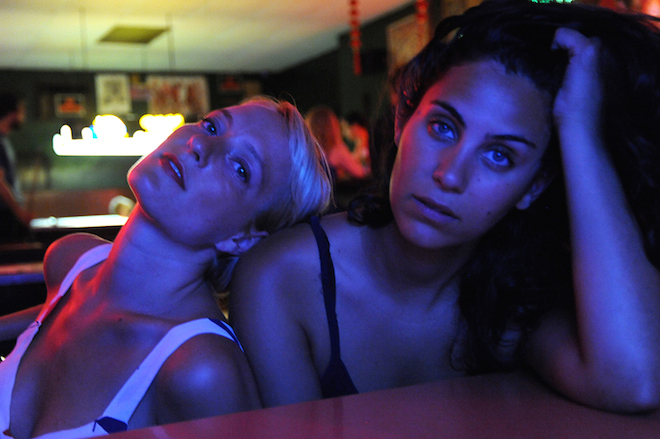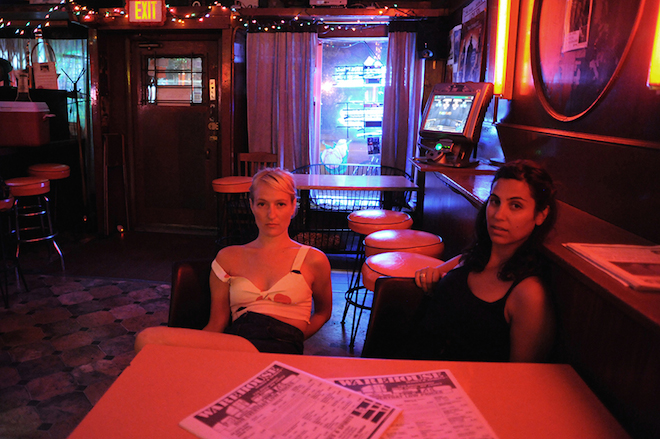Buttercup Bill, the debut feature from filmmaking team Emilie Richard-Froozan and Remy Bennett, is billed as a “psycho-sexual doomed love story.” The screen successfully offers a love story complex and rich with that same kind of psychological entanglement and intensity we so often seek during our childhood years. Off-screen, the directors have their own kind of love story: a friendship that began when they were sixteen during an overseas acting/directing course through TISCH.
Coming full circle, Buttercup Bill recently made its European debut at Raindance and will be playing at the New Orleans Film Festival at the end of October.
Why did you choose to film in New Orleans?
Remy: Well, the setting was rural and we needed a rural setting. And we had friends down there.
Emilie: I fell in love with someone who lived down there and I went down there and that was the catalyst: the house that this person lived in…
Remy: We shot the movie in that house that belonged to the person she fell in love with.
How did it feel to shoot in that house?
Emilie: It’s more that it was the people I met there: all of the community. A lot of those people are in the film and it was just a magical experience so it was kind of like no matter what happens–when we were in production–we just had to shoot it in that house because that house was like a magical place.
What was the process of writing a script together like?
Emilie: Lots of cigarettes.
But what was the physical process itself like? Did you pass it back and forth?
Emilie: No, we’d sit in the same room.
Remy: But we passed it back and forth too. We went through so many phases.
Emilie: Well, we’d start a new scene and then we’d go away and come back.
Remy: It was a long process.
Emilie: It took us like a year and a half to two years.
Remy: You go through so many different techniques. We would talk it out sometimes or we would go away and write stuff and exchange it.
Emilie: We’d go to hypnotists and get hypnotised.
Remy: Or we’d go to a restaurant and get a bottle of wine and just talk for thirty hours one session. But we set it up so it was really our job; we had a schedule.
Which was?
Emilie: We worked odd jobs basically and we would sit down and the next thing you know, seven hours had passed.
Remy: We would usually meet at ten in the morning. So, she’d say, “Come to my house at ten” and we’d sit down and be like, “This is our day and we’re not going to leave until seven.” So we would just sit down no matter what was happening, whether it was us just talking or exchanging stories or talking about our lives and being like, “Oh fuck, let’s write this down.” Or we’d have other days where we just wrote, wrote, wrote…
And, of course, you knew you were going to co-direct and Remy would be acting the role you were together writing for her.
Emilie: Yeah, I had a dream during the whole Buttercup Bill thing and I had just gotten back from New Orleans. I had this dream that there was this blonde girl from behind and I knew it was Remy and I was in the desert and I yelled her name and she turned around but it wasn’t Remy, it was a different name I had called. And when I woke up, I forgot the name and I was like, “I know this name. The name is…” But I couldn’t remember it.
My random friend from when I was 15 who I met abroad and who I haven’t spoken to in ten years… I found him on Facebook, wrote him and said, “What was the name of your really mean Swedish girlfriend when you were twenty?” And he was like, “Pernilla.” And I was like, “That’s the name!” And we just started from there. That name, I always knew.
It must be amazing to see this film as a sort of culmination of your relationship up to this point.
Emilie: Yeah, Remy and I met doing an acting/directing class when we were 16. It was at TISCH but it was in Dublin. Remy was in my first short; we made our first short together.
And you just automatically vibed?
Emilie: I can’t get enough of watching her on the screen. And I know that I’m not the only one: she’s it. You know, there are some people that you just want to watch and there are some that you’re like, “I don’t really need to watch them.” Not her. She’s meant to be on the screen.




 Twitter
Twitter
 Tumblr
Tumblr
 YouTube
YouTube
 Facebook
Facebook
 Instagram
Instagram
